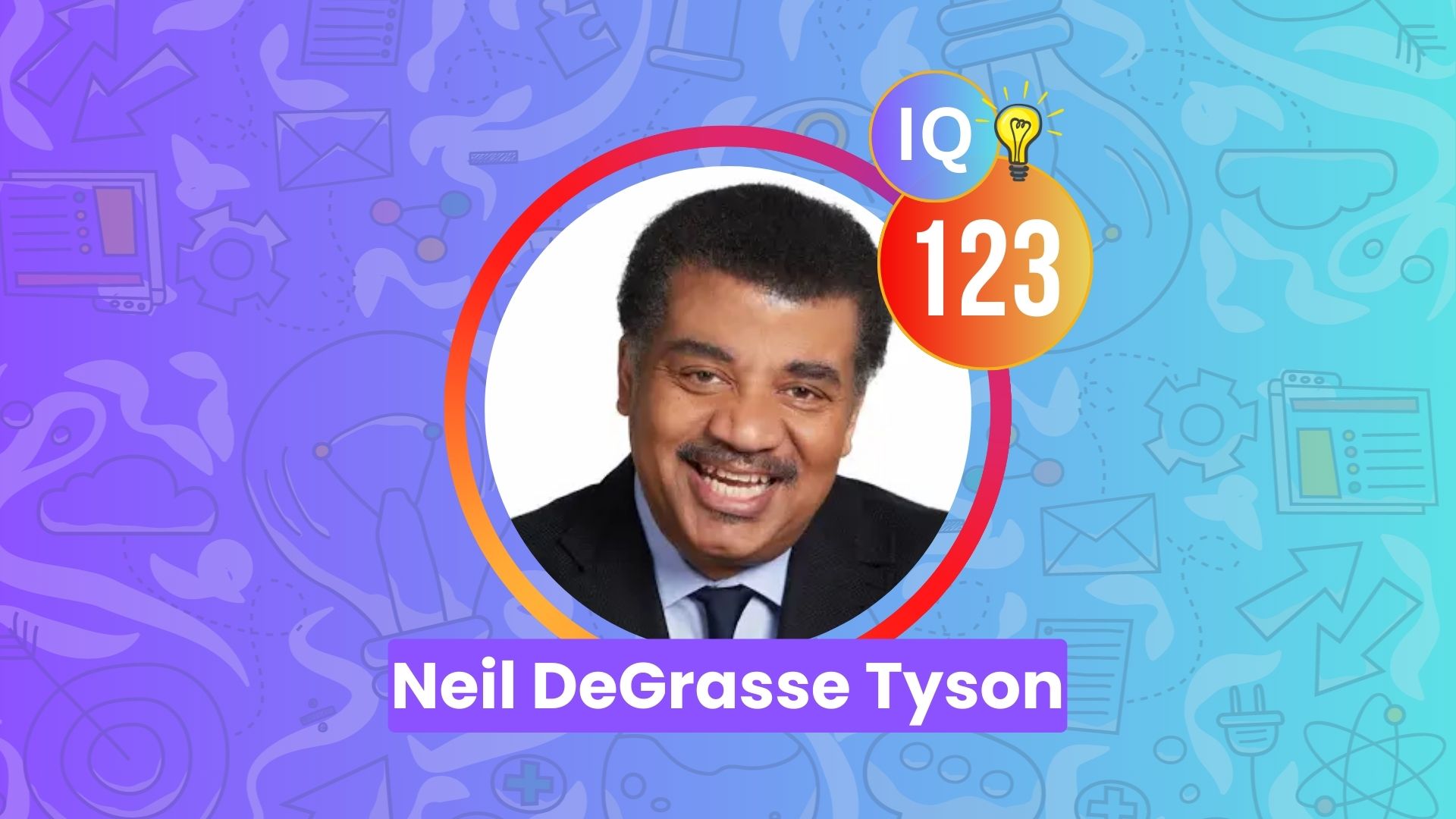Neil DeGrasse Tyson's IQ: Facts, Estimates, & Achievements
Is it possible to quantify brilliance, and if so, how does one measure the mind of a modern-day polymath? Neil deGrasse Tyson, a name synonymous with astrophysics and science communication, presents a fascinating case study, his intellectual prowess frequently debated and admired, yet the precise numerical measure of his cognitive abilities remains elusive.
The world knows him as the affable face of science, a communicator who can break down complex concepts into digestible soundbites. He is a celebrated author, a captivating television personality, and the director of the prestigious Hayden Planetarium. However, beneath the public persona lies a life shaped by rigorous education, an unyielding curiosity, and an undeniable passion for the cosmos. The question that continually resurfaces is: What is the true measure of Neil deGrasse Tyson's intelligence, and how does it relate to his remarkable achievements?
While the exact details of his early life are available, his intellectual journey begins in the Bronx, New York. From 1972 to 1976, Tyson attended the Bronx High School of Science, a specialized public high school renowned for its focus on science and mathematics. This educational foundation ignited a profound interest in science, especially space. The seed of his lifelong fascination with the universe was sown. Following high school, he pursued a Bachelor of Arts in Physics at Harvard University, a Master of Arts in Astronomy, and a Doctor of Philosophy in Astrophysics from Columbia University. This deep immersion in academia has cemented his place in the scientific community.
| Attribute | Details |
|---|---|
| Full Name | Neil deGrasse Tyson |
| Born | October 5, 1958 (age 65) |
| Place of Birth | New York City, New York, USA |
| Nationality | American |
| Education | B.A. Physics, Harvard University; M.A. Astronomy, University of Texas at Austin; Ph.D. Astrophysics, Columbia University |
| Occupation | Astrophysicist, Author, Science Communicator |
| Known For | Director of the Hayden Planetarium, Host of StarTalk, Author of Astrophysics for People in a Hurry |
| Net Worth | Estimated at $5 million |
| IQ (Estimated) | Reported to be around 123 (unverified) |
| Website | Hayden Planetarium |
The popular perception of Tyson's intellectual capabilities often revolves around the widely circulated claim of an IQ score of 123. This figure, while frequently cited across various online platforms and news articles, remains unconfirmed. The absence of officially verified IQ results sparks discussions about the reliability of such metrics. IQ tests themselves are not universally accepted as a perfect gauge of overall intelligence. Critics argue that they often fail to account for creativity, emotional intelligence, and practical problem-solving abilities qualities Tyson has demonstrated in spades.
Furthermore, IQ tests are snapshots in time. The results can be influenced by numerous factors, including test-taking conditions, the individual's state of mind, and the specific skills being assessed. As such, an IQ score, even if accurate, offers only a narrow perspective on a person's comprehensive intelligence. This is particularly true when considering individuals of Tysons caliber whose impact comes from their ability to synthesize vast amounts of information.
Neil deGrasse Tyson's career path is a testament to how intelligence manifests in various forms. His roles as a celebrated author, media personality, and the director of the Hayden Planetarium showcase a blend of intellect and communication skills. His writings, including books such as "Astrophysics for People in a Hurry" and "The Pluto Files: The Rise and Fall of America's Favorite Planet," have made complex scientific ideas accessible to a broad audience. His ability to explain complex concepts in easy-to-understand ways, combined with his charismatic personality, has propelled him to the forefront of science communication. Through shows like Cosmos: A Spacetime Odyssey and StarTalk, Tyson has become a prominent figure in popular culture.
The media often portrays Tyson as a man of many interests. He has hosted television shows like Nova ScienceNow and Origins, using these platforms to share his passion for science with the world. These programs, along with his radio show StarTalk, demonstrate his versatility in connecting with different audiences.
Tysons educational background has contributed greatly to his intellectual prowess. His early passion for science was nurtured at the Bronx High School of Science, where his interest in space truly blossomed. His academic journey through Harvard and Columbia universities solidified his knowledge in astrophysics and related fields. Education is undeniably a significant factor in shaping a person's cognitive abilities. However, it is essential to note that Tysons success is not solely determined by his IQ but by his ability to use that education to the world.
The estimation of Tyson's IQ as 123, while not officially verified, places him in the "superior" range, meaning he would score higher than approximately 94% of the population. Some observers have noted that this could potentially be an underestimation, considering his advanced knowledge and achievements. Several factors may account for this, including the fact that the original measures may have been taken using older, now potentially outdated, testing methodologies. The original figure, if accurate, might translate to a higher score on contemporary scales.
Its also noteworthy that the relationship between academic achievements and IQ is not always direct. While high IQ scores are often seen in high-achieving individuals, other elements such as creativity, emotional intelligence, and persistence also play crucial roles. Tysons ability to share complex scientific concepts makes him a master of his subject. His communication skills and ability to captivate audiences set him apart from academics. He has successfully translated knowledge into compelling narratives, further solidifying his legacy in the scientific field.
Comparisons to other prominent figures in the scientific field often arise in discussions about Tyson's intellectual capabilities. For example, the theoretical physicist, Christopher Langan, is sometimes cited, with an estimated IQ between 195 and 210. Such comparisons, while interesting, may not always be helpful, given the range of skill sets needed to succeed. While Langans score suggests a certain type of intelligence, Tyson has a public presence that has led to a broader impact on science communications.
Tyson's work as the director of the Hayden Planetarium at the American Museum of Natural History is another facet of his accomplishments. This position gives him a platform to inspire future generations of scientists. The planetarium reaches a wide audience, making complex scientific concepts accessible to the general public. Furthermore, it has provided an arena for him to champion science education and promote scientific literacy.
Tyson's financial success is also a factor to consider. His estimated net worth of $5 million comes from his books, television appearances, documentaries, and projects with streaming services such as Netflix. This financial success not only proves his popularity but also allows him to make an impact on the public through funding and collaborations.
When looking into the discussion of whether his personality is that of an "a hole", we have to consider that this is a complex matter. Some of his critics will point out that he sometimes seems to emphasize any factual mistakes made by the interviewers. His fans admire his clarity and the manner in which he brings the focus back to the essence of the query. Others may find his directness to be overly aggressive or even rude. Yet, this perspective highlights that he is a passionate advocate for scientific precision, always striving to ensure the integrity of scientific information.
Tysons use of humor and his ability to connect with audiences on an emotional level have made him a beloved figure. His comedic timing, as demonstrated on StarTalk* and in various media appearances, is a testament to his well-rounded personality. As a science communicator, Tyson seeks to educate and entertain, making him a role model for many young scientists.
Neil deGrasse Tyson's contribution to science communication is undeniable. His estimated IQ score of 123 is just one metric in an assessment of his extensive intelligence. His background, including his education at the Bronx High School of Science, Harvard, and Columbia, has given him a base from which to grow. His impact extends to his role as the director of the Hayden Planetarium, his books, and his media appearances, which have made complex scientific ideas accessible to millions. While the precise measurement of his intelligence may remain open to debate, Tyson's accomplishments reveal a sharp mind coupled with an unwavering dedication to expanding scientific knowledge.


